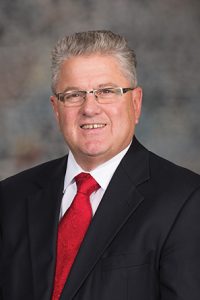Business tax incentives stall on second round
An effort to create a new business tax incentive program to replace the Nebraska Advantage Act stalled on select file May 24 after a failed cloture vote.
LB720, introduced by Sen. Mark Kolterman of Seward, would create the ImagiNE Nebraska Act, under which qualifying businesses would receive a varying combination of incentives—wage credits, income tax credits, sales and use tax refunds and exemptions, personal property tax exemptions or real property tax refunds—based on their level of capital investment and the number of employees they hire at a minimum qualifying wage.
Kolterman said the program would create higher-paying jobs than the Nebraska Advantage Act, the application period for which is set to end next year.
The incentives would be limited to certain business activities, including manufacturing; certain testing laboratories; rail and truck transportation; insurance carriers; wired and wireless telecommunications services; telemarketing bureaus; data processing and hosting services; computer facilities management services; and warehousing and storage.
Agriculture, mining, construction, utilities and public administration would not qualify for incentives.
Gering Sen. John Stinner introduced an amendment on select file, adopted 32-12, that he said was meant to address senators’ concerns that the bill would not cap the amount of tax incentives approved each year.
The amendment would require the director of the state Department of Economic Development to submit to the Legislature an estimate of the amount of sales and use tax refunds to be paid and tax credits to be used under the act for each of the next three calendar years.
If the estimate exceeds a “base authority” of $125 million for any calendar year from 2020 to 2023, the DED director could not approve any additional applications unless the Legislature’s Executive Board approves the director’s request for additional authority.
Stinner, who supported LB720, said the changes would make it easier for the Legislature to budget for the forgone tax revenue.
He said business tax incentives are a long-term investment that benefit the state by spurring growth and investment that lead to new property, income and sales tax revenue.
Sen. John McCollister of Omaha also supported the bill, saying it would be a vast improvement on the Nebraska Advantage Act. He said it is a “sad fact of life” that Nebraska needs corporate incentive programs to compete with other states when trying to attract new businesses.
“All of us want to keep Nebraska … economically healthy,” McCollister said. “LB720 heads us in that direction.”
Albion Sen. Tom Briese opposed the bill, saying it would be an “irresponsible reversal of priorities” for the Legislature to advance business tax incentives without also providing property tax relief.
Briese said he changed his mind and voted to advance LB720 from general file with the understanding that senators also would advance his LB183, a property tax relief proposal. With LB183 stalled, he said, LB720 should go no further.
Sen. Julie Slama of Peru also opposed the bill, saying “outrageously high” property taxes are the biggest hurdle to economic development in Nebraska.
“I refuse to prioritize corporate incentives over property tax relief,” she said. “We still have another year to pass the Nebraska Advantage Act’s replacement—Nebraska will not be closed for business if we fail to pass LB720 this year.”
North Platte Sen. Mike Groene said that by abating taxes on certain businesses, LB720 would raise the burden on other taxpayers to fund government services. Groene opposed the bill, saying the proposed incentives mostly would benefit existing businesses and regular business activity.
“Any economic development program that uses any of our limited tax dollars … must assure the public that every dollar used is maximized for new economic growth, not squandered on the normal growth of existing industries,” he said.
Groene said business tax incentives need to be part of a comprehensive package that includes the provisions of Sen. Lou Ann Linehan’s LB289, which was designed to provide property tax relief through increased state aid to public schools.
After three hours of select file debate, Kolterman filed a motion to invoke cloture, or cease debate and vote on the bill. The motion failed 30-18. Thirty-three votes were needed.
LB720 is unlikely to be scheduled for further debate this session.

